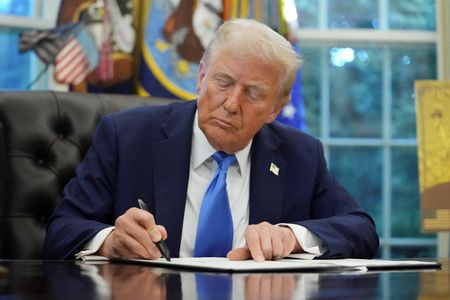By Sarah Young and Kate Holton
LONDON (Reuters) -Nigel Farage’s populist Reform UK party will make it harder for foreign nationals to move to Britain if it wins the next election, tailoring the system to higher earners with strong English with the aim of reducing the number of migrants.
Under the plans, Reform would scrap the current “Indefinite Leave to Remain” status which migrants can claim after five years, and replace it with a five-year renewable work visa, which would prevent holders from accessing welfare benefits.
“There will be a route to citizenship, but a much tougher route to citizenship than we currently have,” Farage told a press conference on Monday.
Reform UK has just five lawmakers in the 650-strong British parliament but leads opinion polls, with 28% of people saying they would vote for the party, a lead of eight points over the governing Labour party. The next election is expected in 2029.
IMMIGRATION A HOT BUTTON ISSUE
Immigration has become a major political issue in Britain, eclipsing concerns over a faltering economy, following a jump in arrivals after the COVID pandemic and as the country faces a record number of asylum claims.
Responding to the Reform threat, the government is already trying to make it harder for migrants to stay in the country, and has said it will launch a consultation on making people wait 10 years to apply for ILR, instead of the current five years.
Reform’s policy would require anyone wanting to start the citizenship process to live in the UK for seven years, rather than the current five. Under current rules, migrants first apply for ILR and then citizenship.
REFORM WOULD RESCIND LEAVE TO REMAIN
Farage said his policy would rescind ILR for those who already hold the status and would force them to reapply for the new working visa.
Those already earning over a certain salary threshold – which was not set out – would be able to stay, with a path to citizenship. As well as salary requirements, the visa would also require applicants to meet a higher standard of English. The number of dependents they could bring would be linked to their income.
Farage said the changes aimed to target the 800,000 new migrants expected to be granted ILR status between 2026-2030 – and would prevent them from accessing welfare payments.
“Reform will ensure that welfare is for UK citizens only,” he said.
In the year to March 2025, Britain granted leave to remain to 173,000 people, a 33% rise on the previous year.
The citizenship rules would make Britain stricter than some other European countries.
France, Germany and the Netherlands, for instance, permit those who have lived in the country for five years to apply for citizenship, while depending on a person’s original nationality, Italy and Spain can require 10 years of residency before citizenship can be sought.
(Reporting by Sarah Young and Kate Holton; Editing by Kate Mayberry and Ros Russell)










